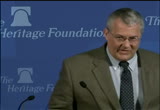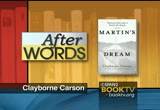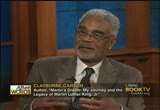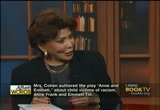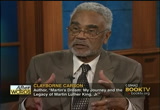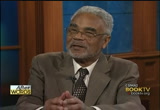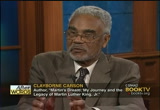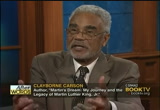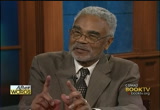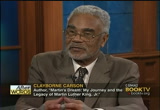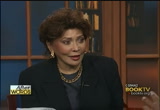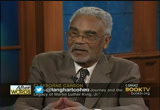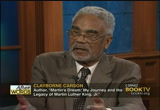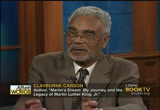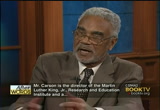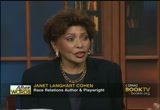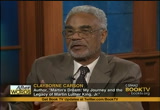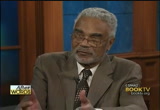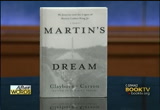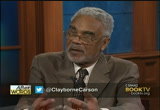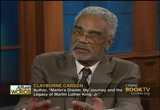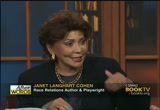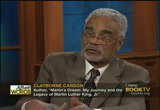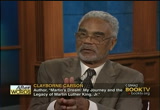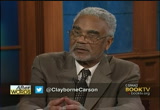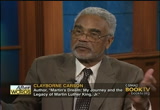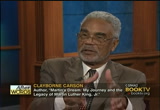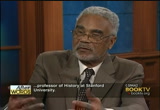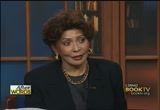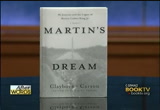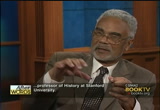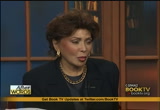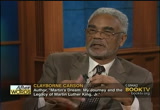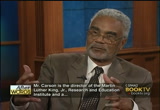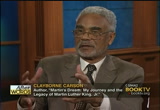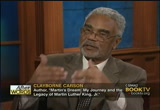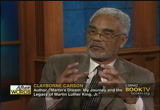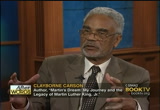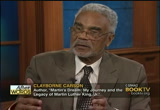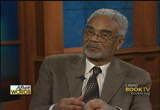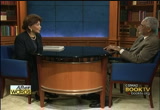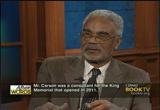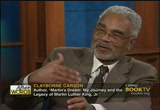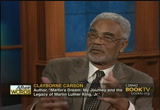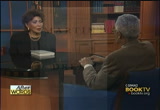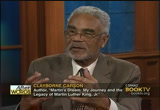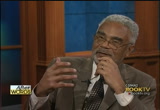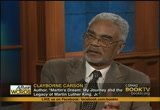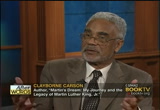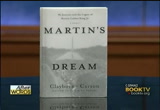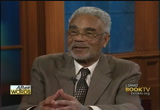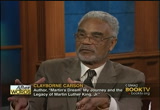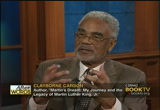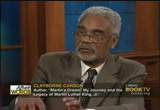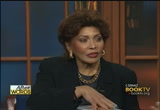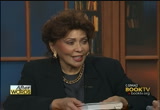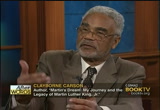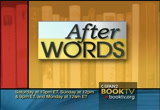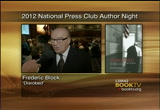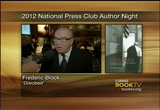tv Book TV After Words CSPAN January 21, 2013 12:00am-1:00am EST
12:01 am
at. >> in the book you talk about your personal journey and you are very candid about your life and cover new insights as a historian from the life and legacy of dr. martin luther king, jr.. what prompted you? >> guest: it is the 50th anniversary and it is 50 years of mine life of the king legacy and to my coming of age. part of it was to do the to tasks. that my life had been connected to the keying
12:02 am
legacy -- king legacy and how king impacted me and i was involved with this amazing journey of editing king's papers. >> host: it is an excellent reid and we are of the same generation and i was also coming of age. it was bittersweet because i knew dr. king he was my mentor. but bitter because the way he was taken from us because of racial hatred. we can start at the beginning the kids you're on the mall with dr. king and at the end you were there again with 50 years later with the monument you help to design.
12:03 am
>> guest: and coming back for important occasions. i only lived in washington a short time but the mall had a great symbolic meaning and sentimental. >> host: it is a beautiful city. 19 years ago, the march on washington where he gave the speech i have a dream. how did you get there? >> guest: i grew up in a small town there were not very many black people. maybe three black families in lowe's alamos and mexico. so what was the black community like? i did not have much exposure a mess with my relatives in detroit. i learned through the
12:04 am
freedom struggle i would pick up the newspaper there was martin luther king, little rock nine. students doing the sit-in and they became my a role models. then i yemen college and i get to go with the association meeting in indianapolis in bloomington. and i meet stokely carmichael, the first person i talked to. i told him i wanted to go to the march and he dismissed that. >> host: why? was see a detractor? >> guest: not just margin mr. king but for me he felt
12:05 am
i should be in georgia or maryland and it so he would go in to these places there was activism instead of the of one day march is not what he had in mind and he was trying to recruit me but going to the one day marcher be the most exciting saying i had done in my life at that point*. >> host: let's go back to the march during the address what did you think? did you think it would be like the "gettysburg address"? >> guest: no. not at that point* it was the title spee to a long day. i was glad to see him in person.
12:06 am
everyone looked for word to what he would say because he was known as a great orator but his speech was very short and this was "60 minutes." they plan to be less but that is how long he wrote it to me. >> host: was a logger? tell that story. >> guest: what i found out later when he got to the end of his prepared remarks he said it required something more. know i can look at the advanced text to see she
12:07 am
talks about go back to the south and continue the protest but he thought the occasion required something more than he was talking about this dream. the american dream. then it is his dream and he was in detroit a few months before and he talked about i have a dream america will realize these principles. he was inspired by the moment. >> to bait him on was tell us about the dream. >> guest: i listened a lot of recordings but i had never heard that.
12:08 am
maybe she allowed the stage whisper. i want to believe that story >> host: and she loved him i stayed at her home in chicago when i was working at "ebony" magazine. dr. king i met him the day after he was hit in the head at gage park in illinois. did you meet dr. king? >> i only saw him from a distance. >> host: how close? >> guest: as close as i could but i got to the floods of the lincoln memorial but the notion as a 19 year-old that i would even shake hands with him would have been the thrill of my life. those times he was a member of a crowd. he came to ucla when i was a
12:09 am
student and that was the other time. maybe 1965. >> host: how does this impact you on the way home? >> i did not tell my parents i was coming and went back to indianapolis. i had to hitchhike. >> host: were you scared -- were you scared? >> guest: of course. but at 19 you think your in principle. >> host: with his influence did you talk to him? >> it was maybe three years before i talked with him again.
12:10 am
1963 he was not a well-known public figure but 1966 was african black power. that is when we got in touch with each other again then stayed in touch the rest of his life. >> host: has one of my heroes as well as malcolm x i was more in an agreement with of later malcolm x and stokely carmichael but as an older i appreciate the teton and -- dr. king tactics. he has the monument. you had misgivings of time magazine naming him man of the year? >> guest: not at all. from a distance i was very proud but i and absorb a lot of resentment from him.
12:11 am
that martin is ticking is following us. we are out there trying to break new ground. for me, moving to los angeles and getting involved with the non-violent action committee and me involved with employment issues and urban issues. one year before king comes to chicago so he catches up also with the vietnam war and we oppose from an early stage and that he was much more and had more to lose.
12:12 am
is easier to discover for the 21 year-old student to take a stand on anything when you have nothing to lose except maybe your draft status. which i did lose. but for king he interested everything he accomplished with civil-rights was the white house and congress was contingent on not taking a stand with vietnam. >> host: president johnson was very upset with dr. king he felt that we have handed civil rights and voting rights over now you go against me that imf for reelection on the vietnam war? >> guest: now eyes understood what courage it took to take a stand that he
12:13 am
did and why he hesitated. coretta did not. she was very involved earlier but she was not the public figure. he could send her to speak with him. >> host: and then proved him right. >> guest: this is the way that he is a visionary. with the anti-colonial movement around the world and have a cold war prevented us to show us we were on the wrong side because because the communist movement had identified itself with anti-colonialism many wanted to have the system of the soviet union they were for it but we were opposed.
12:14 am
>> host: you left the country during the vietnam era. why? >> guest: for me looking back it was not that difficult of a choice. i knew i would not go into military. >> host: weren't you drafted? >> guest: several times. i tried to be a conscientious objector and it was turned down. it came down to our want to go to prison or explore the world? i recognize the five left eye might not ever be able to come back. that is a difficult decision. >> host: a decision between your life and living and outside of your country.
12:15 am
>> guest: i had to think through. >> host: newark father was in the military. >> guest: he was an officer and reached the rank of lieutenant colonel. so for him the military offered opportunity. and because the military needed black officers as a draftee he to go to officer training and have opportunities within the military he never had in the civilian life. >> host: but not for you? >> i thought about it i could apply to the air force academy in west point. i see how easily my life could have gone in a different direction. >> host: couldn't you join in the navy to avoid the draft?
12:16 am
did you discuss it? >> by that time i was very politicized and i would have felt guilty i took the easy way out. i think i knew i could have gone into the military. i may not even have been sent to vietnam but then it was more symbolism that's i did not want to support the war. >> host: people or black people are aged had difficulty reconciling to serve the country to risk their life. >> guest: those in the fight for democracy i did not have to go than thousand miles.
12:17 am
>> host: did you think about it? >> i came very close. in the run up to the mississippi project i went to new orleans and other people there and fought seriously probably if not for the financing to bring there own money to bail themselves out, i worked my way through school. i needed a job to finish college. >> host: talk about that. you mentioned snic and dr. king organization was the overall mission? the voting rights? double rights?
12:18 am
how was the approach different? >> both started with freedom. in some ways we mislead ourselves with the civil-rights movement. if that was the goal of 1965 the agenda was achieved. 64, the active 65, if that was the goal, margin is 13 could retire and go to of college to be that campus minister in carmichael said i could achieve my goal because all of us saw the goal as much more radical. economic change, empower the black community or the black power movement, using the
12:19 am
rights that were gained to bring about concrete we saw in 1965 as the beginning now we have basic human rights but what will you do? now the community is 100 years behind you cannot say suddenly you will catch up. there has to be a movement. where do we go from here? that is where we still are we cannot answer the question what do we do with the rights or citizenship? >> host: dr. king talked about moving from the quicksand to the hard rock
12:20 am
of brotherhood we have a black man in the white house but michele alexander is the author of the new jim crow she talks about statistics in the 21st century under employed and unemployed clear more afflicted with aids and obesity with tougher sentences for the same crimes but we have a black president and i think the silence in the black community is deafening we would protest everything after we got voting rights and we wanted more. leidy think they are silent? >> you can see the difference of the support that king got when he was
12:21 am
fighting for civil rights reform through 65 the level of support with the widespread support for what he was trying to do. after 1965 moving to chicago with garbage workers and for people he wanted to occupy the national mall. even during the occupy campaign in recent years no one point* something so for word with his support it went down dramatically. >> host: why? they thought it would make white people angry? >> guest: there was
12:22 am
support for the early king for the black people doing well so for them once you remove the jim crow barriers come to the agenda is gone. at that point* there overqualified. opportunities will open up because they no longer face racial barriers. jobs are opening. so they don't need another movement the movement is just beginning to getting the vote and the right to go to a restaurant or hotel. what have you gained? >> a large amount are still
12:23 am
pork. -- pork and we're still silent. >> guest: but people who came out of the middle-class solve their responsibility to help verbalize for those who were destitute. that is what snic was. college students the grandson and a granddaughter of black peasants and people like myself. with segregated schools. >> host: or richard father from? >> guest: alabama originally but part of the migration that went to detroit to during world war war i. >> host: our parents' generation chose to show their activism against racism by moving and ours
12:24 am
was a protest. >> guest: historic day for most people who come from the peasant background it was not from a political movement that toward the free environment of the city that is what most people did been in the process some became politicized. >> host: they thought they would be markedly different. >> guest: that they would not be murdered for taking a stand in the relatively free environment they could create the conditions for the modern movement. >> host: talk about the
12:25 am
movement and snic and others. who were the people that moved the most? king comment now, x, john lewis, stokely carmichael? >> all of the above. i tried to explain to students rosa parks made more to mr. king possible. not vice versa. if she did not do what she had done margin mr. king would be inarticulate well-meaning baptist minister. because of rosa parks we talk about him today. she opened up the possibility to open those qualities to rise to the equation.
12:26 am
>> host: while she refused to give up her seat she was thinking of the 14 year-old black boy from chicago who went to mississippi because he whistled at a white woman was brutally murdered. to that change your spark anything with the civil rights movement? >> his death, brown vs. board of education decision killing of civil-rights workers, the young high-school student who led a walkout to protest against fifth inferior education. 1951. many people we don't even know there names or other teenagers who did the same
12:27 am
thing. so the resistance largely among young people. >> definitely when you talk about south africa, we all remember nelson mandela who was in a prison cell. for others to revived a movement in the early '70s and the late '60s. >> host: talking about children, james did something that got a lot of criticism for him and dr. king. >> guest: king was at a crucial point* in birmingham
12:28 am
with millions of people across the country followed him. from montgomery which king did not initiate, through birmingham, king is a leader in search of a following. only in birmingham can he initiate and sustain a movement the dow reached a crucial point* in 1963 all those who were adults who were willing to get arrested already had been arrested. he writes his letter from the birmingham jail. it was not clear he bush win in birmingham. if he lost there would be no march upon washington or nobel peace prize. so what saved the day in birmingham is there were no
12:29 am
adults to be arrested but james says there are young people who are eager to be arrested and to join and we have been restraining them. and at that point* they come into the picture to save the day for martin luther king. >> host: are there any pictures that come to mind? >> guest: of course. the dogs and hoses but one involved told me that being in high school teachers and principals knew they had to keep the students under control and by that time resentments were boiling over. so day locked say gates.
12:30 am
12:31 am
going back to birmingham and conducting a funeral. >> but did you feel guilty? >> guilty about all these kids being in jail, he felt guilty that he tried to explain and i remember listening to one of his speeches. he said these children are doing -- they need to do this for future generations. some of their parents i think recognize. my own parents didn't want me to get involved. they brought me to los alamos mexico so i didn't have to deal with that.
12:32 am
>> host: you mentioned that you were surprised at the church bombing of the complacency. people seemed to react to people being murdered, yet we all see what happened in that tragedy at the sandy hook elementary school why were people moved by those children being murdered? >> guest: people are as concerned about the death of a black child and as they are about the death of a black child that is one of the fundamental issues that we still address. we have had situations where assault weapons are used on a weekly basis in their urban areas and the victims are children. >> host: 500 people in 2012
12:33 am
for murder, black people were murdered on the south side of chicago and seems to matter more that they are killing each other in their children are dead and it doesn't seem to be the uproar in the country even in our community about it. >> guest: but that's where we are as a nation. most americans black-and-white and of all races understand the we are not the equal nation that we say we are. but there's still a reluctance to address that issue and understand that part of it comes from if you put one of the laws of school education is that white children are an inferior schools. >> host: there's action.
12:34 am
>> guest: there's action and that is one of the things about this segregation is that many black parents understand if they get their kids into school with white kids they have leverage. one of the problems is the way in which we went about desegregation is that i agree we should have had -- that kid should have been allowed to go to central high school but what about the 900 of the first bill in the all blacks cool? what is being done to make sure that their education as equal because that would have cost a lot of money and a lot of resources and that is where the nation failed. yes we need to break down the racial barriers and make it possible to have an all white school but that still doesn't
12:35 am
happen to deal with the problems that happen. >> host: in boston in the 70's some of it, the busing in michael foot court-ordered busing. we didn't allow our children to go to school with white kids because we wanted to integrate. they go to the schools because they are better. the books are better, the teachers are not necessarily better but the opportunities are better and it goes back to my other question of where are we on the quicksands of racial injustice and the hard rock? not just black people but white people, too. where are we? are we somewhere in the middle? are we almost there? where are we? >> guest: we need to do two things. one is to submit the victories. in the generation of people who bring an end to the jim crow system itself, to legalize the
12:36 am
this segregation that existed, the generation that ended colonialism. when i tell my students about colonialism there's a few colonies left about apartheid. this kind of legalized discrimination of racism so the victory over white supremacy has a legalized system of oppression that is a tremendous victory and the heroic figures of that. that's why during that time the majority of humanity the status changed. how many times that has never happened in history where the majority of people in a relatively short period of time went from being peasants to citizens. but now.
12:37 am
>> host: told them to wait about 150 years of apartheid here in america of jim crow and we were told to wait and many black people were told to wait four more years for president obama's second term. women brought their issues to the president, the comprehensive immigration reform and the governments are bringing their issues to the president. we are not bringing our issues. martin luther king's issue. >> guest: who is stopping us? it's one thing to say president obama is not responding but what are we doing to put the issue so that we have to respond? to me we are not using that leverage. everyone knows that it's the
12:38 am
black vote. the latino vote but it was decisive in the last election. when, each of these groups that played a role, that's why in my view when i came here for the inauguration i said the day before the inauguration i give a speech and i said the important day is not tomorrow. we celebrate that. the important days the day after tomorrow. what are we going to do then and for a lot of people they went home and celebrated. >> host: it is a milestone. i never thought i would see a black president. so it is to be we've talked a great deal about the movement and very little about you but i think we are getting to know you're here in your comments.
12:39 am
you ended dr. king's papers. there are several peepers in boston university. how are the papers that you edited -- >> guest: they're all very different. the papers line editing, the papers at boston, the papers in atlanta, the papers and so many different places, hundreds of archives around the world. i found papers in india. we bring them all together and decide how to publish them and make them available to people. that's been my job for the last 25 years. >> host: do ra history and african-american, i can see your interest. what really brought you to want to do this? his wife asked you, but what was your motivation for wanting to do it? >> guest: i had a lot of doubts when she called and asked
12:40 am
because i didn't know if i wanted to devote the rest of my career to doing this. >> host: how did she ask you? >> guest: she asked me if i would be interested in and when we first talked on that phone call i said are in their other people that have done more work really on the grassroots dimension of the struggle, not so much on the role. i've never really written very much about came apart from the movement. so, but then she came out and i remembered my wife and i do want to spend the rest of your career you could have been editor of the papers, but we turned it down, and i think she was a little bit wiser than i was at that point of recognizing that we don't get asked by the way as a person that you admire all your life. >> host: what did she hear about you? >> guest: franklin and bobby hull, the historian.
12:41 am
a number of people who were mutual acquaintances. she was looking around for someone to take on this role and they said at this time there's a young scholar out of stanford who would do good and he's written about the move meant so that's what led to this phone call >> host: she had love letters from dr. king some of them under her bed at her house. >> guest: i could go all over the world as i said to india, all over these places to try to get material and people were telling me she had some papers under her bed in her house, so part of what i tell in this is a gradual process by which i gained access to those materials.
12:42 am
>> host: how did you do this -- to have several pieces interested but she had them in her home. >> guest: when he decided -- >> host: this is the ljungqvist son of dr. king? >> guest: he is the youngest one, i'm sorry, yes. he's the youngest son and he had decided that he wanted to bring them all together and put them up for auction. so at that point, the question became what's going to happen with all of the papers in the home and that's when i began to go through all the materials and i found that they were extraordinarily rich. they opened up a whole new dimension about martin luther
12:43 am
king as a minister of you could go through that and you could find out what he was thinking about putting together these sermons, what is he reading? his library was there and i would go into the basement and go through all of these materials and i would find a handwritten -- >> host: did he write longhand? >> guest: many times in longhand, and for example i have this longhand a yellow pad in which he rode out the draft of his acceptance speech of the nobel peace prize, and when i first saw that it was like my heart stopped because first of all you have this sense the last person who touches this is martin luther king. >> host: how did you see him ebal? you talk in the book about him being more of a profit and a protester. did you see his early philosophy as a seminary student as a theologian?
12:44 am
>> guest: he was i think one of the things that set him apart to go to meetings and organized campaigns and stuff like that he wasn't really the best at that. i think what he was best that is one example would be the montgomery bus boycott. the boycott was 100% from almost 100% successful before he became the leader. the first day of the successful boycott they had a rally -- he was the one that recognized the historical importance of what they had done. i'm sure they are looking at it and saying now we have a boycott
12:45 am
to not bring about desegregation of the buses but the treatment under segregation but he says no that's not what it's about. every american history but now you see the boycott. >> host: that young man on the mall when you were 19 and you have your feelings string and heard him. you are reading what he wrote in rough draft what is the picture of him then and how did he change for you when you wrote those letters? >> guest: i began to recognize that and there's a chapter in the book about compiling his autobiography. taking all of his autobiographical putting it
12:46 am
together in a narrative like the tide of narrative he would have written if he had the time. and when i get to the march, i am recognizing that now i can see that person that i saw from a distance and i'm looking at me through his eyes because he's describing people like myself coming to the march from all different directions and all forms of transportation and these people who are becoming active in this great struggle, so i'm seeing my 19 year old self through the eyes of the person that i saw up there. i would have never -- if you can imagine being a 19-year-old kid at that point imagining 12 years later i would be the professor of history at stanford
12:47 am
university that would have been inconceivable but 12 years later or two decades later i would be getting a call from coretta scott king more that two days later i would be designing the king memorial. >> host: there's another question about the papers. there are some charges against dr. king. he found someone wanted discoveries. i hate to talk about it but in full disclosure we have to talk about all these things. >> guest: i think it's necessary to not put him on a pedestal. martin luther king was a flawed individual and i found this out when i was going through his academic papers and fighting tooth of finding plagiarism. how old was he when he was doing this? was he in school?
12:48 am
>> guest: in college, these were academic papers. it wasn't like he was handing in a paper that he had copied from somebody else. it was -- the way that i would look at it, he was taking passages and sometimes writing them accurately sometimes not attributing. crusco when preachers preach the preach from the bible -- >> guest: and then hand it into a college professor. that's the difference what you can do and what you can't do, and one of them is everything that you get from another source you attribute to that source. >> host: we need more time because you're wonderful book. doorplate. you want to do more with dr. king's legacy ban just write a book or two papers. there are passages of martin luther king.
12:49 am
tell about the play. you took it to china and palestine. those are amazing places to take a play about dr. king as a protester against government. talk about that for a minute. >> guest: i've engaged in doing documentaries on the movement of martin luther king and i've looked at eis on the prize. this she suggested i have to create my documents by interviewing these people you've spent your life bringing together the sources we don't take this material and true to form it into a play. i thought it was a great idea. i didn't know how much work i was going to get and how difficult it would be.
12:50 am
the play was produced at stanford and i worked very closely with a person in the drama department and they put it on their program and we did it. since then i've been tinkering with it and it's been kind of like a hobby. in taking it to china and taking it to palestine how did you write a play, go through all you have to do in the different governments and what was the reception in those prospective areas? >> guest: in china one of my students was there to be the devotee accident. i visited when she was in china and she was there for a long period of time. i had written a script and she
12:51 am
said look like can't we do this in china with a great impact to bring king and convinced them to do with and i had a theater company in china at my disposal. this was in 2007 and we performed it in a theater less than 2 miles from trademark and a square so we were performing the protest with a chinese martin luther king beating protestors and all of this is taking place within walking distance of tiananmen square. so translating king's legacy and bringing a gospel choir with acy
12:52 am
three of my students are part of the choir and i call them up and i said how would you like to go to china, the theater of china so they had the opportunity to come and work with the greatest theater company as well as people from other parts of the united states because this was the first time african-american performers had performed on the same stage in a play in china. >> host: sent you a historian makes history. >> guest: it was historic and then we also did it in china. i'd take in the interest and had gone to the palestinian territories back in the 90's because the role of non-violence, the need to bring on violence and to this dispute between the palestinians and i thought why not bring it thwacks and again this was the palestinian national theater and
12:53 am
taking on this play we took it to eight different communities not just voted in jerusalem and east jerusalem but ramallah and all these different -- >> host: what was the reaction on the government? again, bringing protestors in the story -- >> guest: i didn't ask the permission. >> host: did you have to have it? >> guest: not really. we had a little bit of trouble getting in, but once we got into israel and coming through israel into jerusalem it was not to oppose it. i'm sure they could have shut it down if they wanted to. >> host: we always hear of some conflict and the word terrorism is always mentioned. here you found the net interest and nonviolence.
12:54 am
>> host: >> guest: including one of the students that had taken my class and i had taken him to india. a student from ramallah so i would take him to hindu and he comes back to his home town of ramallah and is one of the leaders of the nonviolent movement on the west bank and stays the freedom ride in the west bank. >> host: how did it turn out? >> guest: i got arrested of course, but it was a way of challenging the discrimination against the palestinians in a non-violent way. >> host: there is so much to talk about. we didn't get to your being on the mall again when the monument was dedicated. did you have anything to do with the drum major concord?
12:55 am
>> guest: i tell the story of that, the good and that and you see part of the division and of the things that are set in stone -- >> host: how did you feel when you stand and look at him having appointed u.s. thomas jefferson what did you feel? >> guest: we wanted them looking directly at thomas jefferson and the memorial as it was built was looking towards the airport. >> host: what do you think he would say to thomas jefferson if they had a conversation? >> guest: exactly what he did say. he wrote these wonderful words, let's live up to them. we need desolation defeat the nation to live up to it and we justify our independence on the basis of this declaration that says all people are treated equally and they are endowed
12:56 am
with rights. so, now we have this obligation as a nation if we justify our independence they have to live up to eight. >> host: the last book was entitled where do we go from here and your book is a wonderful dream. thank you for this book. if you look at it i did something my teachers told me never to do to books because they are sacred. i dhaka year to some of the pages because i wanted to go back and read. >> guest: that is a better complement to in author. >> host: it is used as you can see. thank you so much for joining me on "after words." good luck with the book. >> that was "after words," booktv's signature program and it authors of the latest nonfiction books are interviewed by journalists, public policy makers, legislators and others familiar with their material.
12:57 am
"after words" errors every weekend on booktv at 10 p.m. on saturday, 12 and 9 p.m. on sunday and 12 a.m. on monday. you can also watch online. beneteau booktv.org and click on "after words" in the booktv series and topics list on the upper right side of the page. >> we are here with the author an inside look at the life and work of a federal trial judge. you were brought onto the court in 1994. >> correct. 1994 was nominated by president clinton, recommended by senator moynihan. i've been there the last 18 years. >> your subtitle inside look at the life and work. give me a regular day in the courtroom. >> a regular day in the courtroom. there is no such thing as a regular day in the courtroom. we sentence people jail three or four times a week and we have our share of high-profile trials
12:58 am
as we sit in new york city. i had a trial and the bear stearns trial and life in new york city is a very dynamic judgeship because we are pretty much where the action bar. i've had cases you name it we haven't. >> how to use separate your professional and personal life? i'm guessing this is a consuming stomach i like to believe i have an integrated life. i'm a musician, i wrote this book at the age of 78. i never thought i would be doing that but the reason i did that is because i really believed that we need more transparency and out with a federal judge is doing and what we are all about. the public doesn't have a lot of awareness or understanding to get the whole trick is to be able to try to bridge that gap and a federal court judge that's not an academic book or a boring book but the sort of book that at the same time people will learn an awful lot about how we run the courts and how you
12:59 am
become a federal court judge. there is such a need for that. >> you sat on the bench for a long time now. can you tell us one of the biggest cases? >> i've had a lot of them. of course they are all in the book. i had the trial that is a major case. i had mcnall some, one of the profound in the history of new york city. i recently had a bear stearns trial where the hedge fund guys were acquitted and sentenced a terrorist person to death and the kids in new york city and on and on and on. i look back at my life and i can't believe that i actually have all of these but i feel very blessed to have had the opportunity to serve as a federal judge in new york. >> talking to frederick author
563 Views
IN COLLECTIONS
CSPAN2 Television Archive
Television Archive  Television Archive News Search Service
Television Archive News Search Service 
Uploaded by TV Archive on

 Live Music Archive
Live Music Archive Librivox Free Audio
Librivox Free Audio Metropolitan Museum
Metropolitan Museum Cleveland Museum of Art
Cleveland Museum of Art Internet Arcade
Internet Arcade Console Living Room
Console Living Room Books to Borrow
Books to Borrow Open Library
Open Library TV News
TV News Understanding 9/11
Understanding 9/11